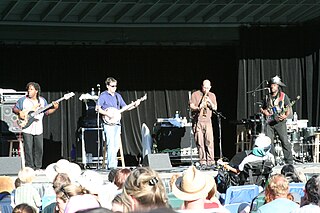
Béla Fleck and the Flecktones is an American band that combines jazz and bluegrass music.

Béla Anton Leoš Fleck is an American banjo player. An acclaimed virtuoso, he is an innovative and technically proficient pioneer and ambassador of the banjo, playing music from bluegrass, jazz, classical, rock and various world music genres. He is best known for his work with the bands New Grass Revival and Béla Fleck and the Flecktones. Fleck has won 15 Grammy Awards and been nominated 33 times.

Victor Lemonte Wooten is an American bassist, songwriter, and record producer. He has been the bassist for Béla Fleck and the Flecktones since the group's formation in 1988 and a member of the band SMV with two other bassists, Stanley Clarke and Marcus Miller. From 2017 to 2019 he recorded as the bassist for the metal band Nitro.
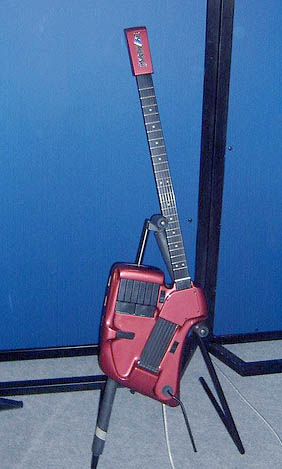
The SynthAxe is a fretted, guitar-like MIDI controller, created by Bill Aitken, Mike Dixon, and Tony Sedivy and manufactured in England in 1985. It is a musical instrument that uses electronic synthesizers to produce sound and is controlled through the use of an arm resembling the neck of a guitar in form and in use. Its name comes from the words synthesizer and axe, a slang term meaning guitar. The system was developed as a joint venture funded by Richard Branson's Virgin Group.

Béla Fleck and the Flecktones is the first album by the band of the same name, released in 1990. It reached number 17 on the Billboard Top Contemporary Jazz Albums chart. At the Grammy Awards of 1997, a live version of "The Sinister Minister", a track from the album, won the Best Pop Instrumental Performance award.

Flight of the Cosmic Hippo is the second album by Béla Fleck and the Flecktones, released in 1991. It reached number 1 on the Billboard Top Contemporary Jazz Albums chart. The album title came from an audience member who suggested "Flight of the Codeine Hippo"; the band changed "codeine" to "cosmic".

UFO Tofu is the third album by Béla Fleck and the Flecktones, released in 1992. The title is a palindrome, which is also a musical theme in the title track; the idea originated with the musician Baby Gramps.
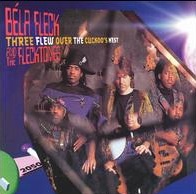
Three Flew Over the Cuckoo's Nest is the fourth album released by Béla Fleck and the Flecktones, released in 1993. It is the band's only release as a trio, after the departure of Howard Levy but before the arrival of Jeff Coffin.

Live Art is the fifth album released by Béla Fleck and the Flecktones and their first non-studio album. It was recorded live at various concerts between 1992 and 1996 and features ten guest musicians.

Left of Cool is the fifth studio album released by Béla Fleck and the Flecktones, released in 1998.
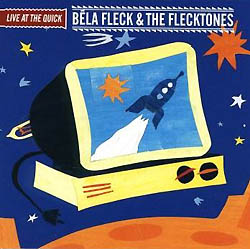
Live at the Quick is the ninth album released by Béla Fleck and the Flecktones and their second live album. It was recorded live at the Quick Center For The Arts in Fairfield, Connecticut in 2000.

Outbound is the eighth album by Béla Fleck and the Flecktones, released in 2000. It is the band's first album on the Sony/Columbia label. The album won Best Contemporary Jazz Album at the 43rd Annual Grammy Awards.

Little Worlds is the tenth album by Béla Fleck and the Flecktones, released in 2003. The album was released as a 3-disc set. Ten tracks from the set were also released on a single disc called Ten from Little Worlds.

A Zendrum is a hand-crafted MIDI controller that is used as a percussion instrument. The Zendrum was influenced by the "Drumitar," invented by Future Man. There are several Zendrum models that are well-suited for live performances: the Z1, ZX, EXP, ZAP series, LT and the Mallet Pro series and Melodic Finger. The Zendrum ZX and Z1 can be worn like a guitar and consists of a triangular hardwood body with 24 touch-sensitive round MIDI triggers. The EXP has 29 triggers and additional controls. The Zendrum LT can also be worn with a guitar strap, and has 25 MIDI triggers in a symmetrical layout, which provides an ambidextrous playing surface. The ZAP series is designed more for table top use or on a drum stand, with the ZAP1 having 19 triggers, and the ZAP2 having 25 triggers. The triggers are played by tapping or slapping with the fingers or hands. As a controller, the Zendrum does not make any sound by itself. It uses an electronic interface called MIDI to control synthesizers, samplers, drum machines, sound modules, computers or other electronic drum devices that generates the musical and percussive sounds. The Mallet Pro Series is laid out and played like a traditional mallet instrument, like a marimba. The Mallet Pro series has naturally resonating solid walnut bars as triggers.
#41 is a song by the Dave Matthews Band, featured on their 1996 album Crash.

The Hidden Land is the eighth studio album and twelfth album overall released by Béla Fleck and the Flecktones, released in 2006. It was recorded before the band's year-long hiatus during 2005 and released afterward. The Hidden Land won the 2007 Grammy Award for Best Contemporary Jazz Album.
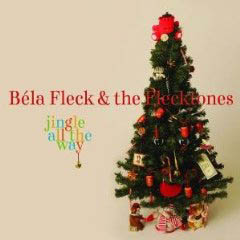
Jingle All the Way is a Christmas album and the thirteenth album overall by Béla Fleck and the Flecktones. Released in 2008 under Rounder, it marks the band's first record since their departure from Columbia. Jingle All the Way reached #1 on the Top Contemporary Jazz chart, the group's first album to do so since 1991. It also won the 2009 Grammy Award for Best Pop Instrumental Album.

Tales From The Acoustic Planet is an album by American banjoist Béla Fleck. It is a jazzy album with roots in bluegrass, where Fleck is joined by bluegrass stars, as well as his jazz friends and Flecktones members. This is also his first solo album since 1988's Places.
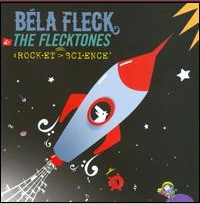
Rocket Science is a studio album by Béla Fleck and the Flecktones, released in 2011. It reached number 1 on the Billboard Jazz chart and number 36 on the Top Independent Albums chart. The song "Life in Eleven" won Best Instrumental Composition at the 54th Annual Grammy Awards.
Joseph Wooten is an American keyboardist, singer, songwriter, author and philanthropist. Since 1993 he has been a member of the Steve Miller Band.


















